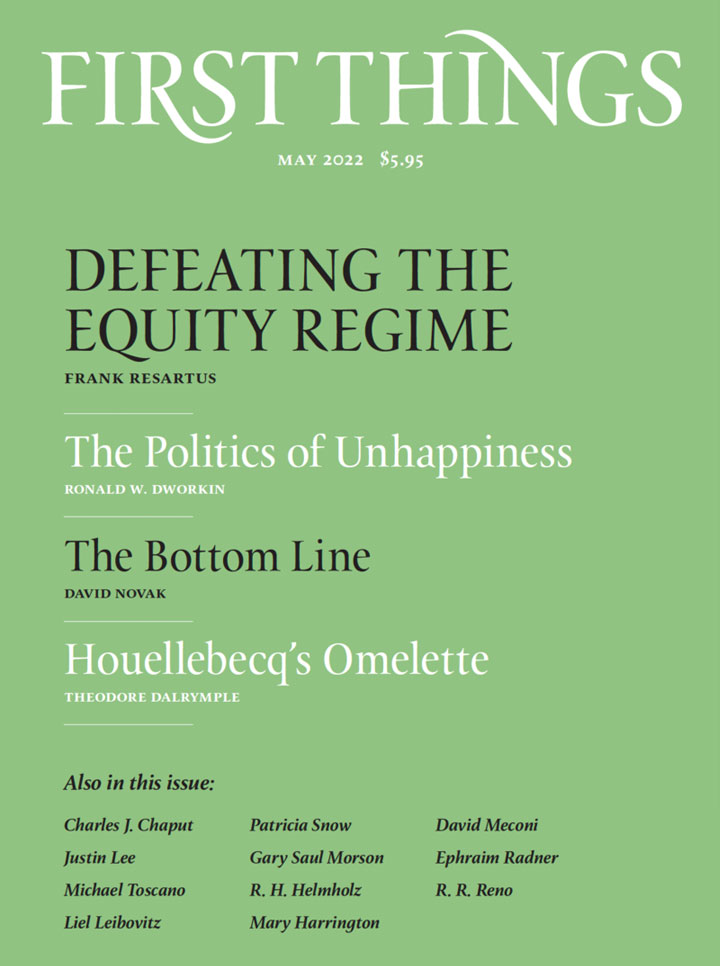These days, it seems, my friends fall into two groups: The Red Hots and the Blue Birds.
The Red Hots are the angry sort. They stand, like fly fishermen, knee-deep in the torrent of news stories washing over us, angling for the latest catch to feed their appetite for outrage. They don’t just get mad about the occasional headline—they are actively looking for everything and anything that might confirm their suspicion that their enemies, real or imagined, are at it again. If they’re on the left, they spend hours railing against the vast right-wing conspiracy. If they’re on the right, they take to Twitter and tut-tut about the woke mob or cancel culture. Either way, they’re fuming.
Not so the Blue Birds. These gentle souls are, well, sad. Buy them a cup of coffee, and without too much prodding you’ll hear all about how terrible everything is. Can you believe, they’ll plaintively ask, how debased our culture is? How broken our politics? How tattered our institutions? Ask them about their day, and they’ll mumble something about the national birth rate being at an all-time low, or opioid deaths at an all-time high, or any other statistic that suggests we’ve lost our collective will to live.
Rage and despair: These are the two dominant flavors of the zeitgeist. Both are rancid. Not that we’ve nothing to stoke our ire; much of observable reality these days is grim. But people of faith have a better, infallible source of renewable energy—hope.
Just how does it work? Walk into a bar and say you feel optimistic about the future, and you may be asked to leave on account of already appearing inebriated. Hope—the real thing, not the cheap knock-off politicos use to paper over their ill intentions—is neither simple nor Pollyannaish. It’s a complicated spiritual virtue, and never has it been more lucidly displayed than in the old Talmudic story about Rabbi Akiva and the fox.
The latter, a reddish and beloved member of the canine family, needs no introduction. The former, to the uninitiated, is a great and wise rabbi whose teachings remain seminal in Judaism to this day, nearly two millennia after his passing in the year a.d. 135.
Akiva was no stranger to hope. He was born impoverished and illiterate, and spent much of his life as a shepherd, tending the flocks of a rich man. Akiva fell in love with his employer’s daughter, Rachel. With little to offer this princess of privilege, he took off, promising to return when he’d made something of himself. It took him a few years, but when he marched back into town he was flanked by thousands of adoring followers. The shepherd who couldn’t read or write had transformed himself into the mightiest Torah scholar around.
This tale of rustic rube becoming rabbinic royalty gives us a lot to feel hopeful about, and discredits those sinister nabobs who argue that our destiny is sealed by our race, sex, socioeconomic status, or other accidents of our birth. But Akiva’s theology of hope is far more intricate—and far more relevant to us today.
Which brings us back to the fox.
One day, Akiva, now old and for a long time a celebrated rabbi, was taking a stroll around Jerusalem with three of his friends, all wise and important elders. They reached the site of the former Temple, Judaism’s holiest place, ransacked and destroyed by the Romans in a.d. 70. There, among the ruins of a spot considered so sacred that only the High Priest could enter it, and even then only once a year, they saw a small fox frolicking about. The wise men started weeping for all that was lost. But Akiva began to laugh.
The other rabbis, the Talmud tells us, looked at him reproachfully, asking, with barely concealed rage, how he could chuckle when the building that had previously served as God’s earthly abode was now just a pile of stones and a playground for predators.
Akiva responded, as he often did, by quoting the Bible. In this case, he cited Isaiah 8:2: “And I took unto me faithful witnesses to record, Uriah the priest, and Zechariah the son of Jeberechiah.” His friends might’ve felt a touch confused: The two prophets the verse mentions lived decades apart and sounded nothing alike. Uriah is best remembered for his gloomy tales of destruction—“Therefore, because of you, Zion shall be plowed as a field”—while Zechariah gave us the more joyful promise of a peaceful future, foreseeing that “old men and women shall yet sit in the streets of Jerusalem.”
Which, Akiva explained, was precisely the point. “As long as Uriah’s prophecy had not been fulfilled,” he said, “I feared that Zechariah’s prophecy might not be fulfilled either. But now that Uriah’s prophecy has been fulfilled, it is certain that Zechariah’s prophecy will be fulfilled.” Or, put simply, if you believe in providential devastation, you must also believe in divine redemption. This isn’t an abstract theological statement, subject to the whims of the spirit. If you read the Bible carefully, you’ll see that Rabbi Akiva’s thinking is reinforced by reason and observation: For anything to grow, you must first plow the earth. Observe the field a moment after every inch was upturned by the plow, and you may see nothing but the violent reshaping of a land mass. But if you understand basic agriculture, you’ll know that into these gaping wounds of earth there will soon be dropped seeds, which, not too long from now, will grow into fruitful trees.
To watch anything break down, then, is merely to witness the beginning of something generative and new; wisdom is the ability to glance at the ruined city on the hill and imagine, generations from now, our happy descendants sitting in the exact same spot, now rebuilt in splendor. It’s all the easier to imagine future flourishing when you believe that God conducts the music of history.
We folks of faith, then, have our marching orders. The discontent we’re seeing all around us isn’t about politics or money or anything quite so transient. It’s a spiritual crisis. Our brothers and sisters have lost faith, not just in God, but in nature’s regenerative power. Terrified, they are turning to those terrible synthetic and deadly substitutes, despair and anger. Our job now is to follow Akiva’s example and remind our loved ones—with a nice fit of laughter, if possible—what real hope looks like.
We may choose to pepper our pep talks with some supporting evidence. We may, for example, call attention to the fact that many of our most prominent entertainers these days are Christians who are wonderfully open about their faith. Or we may marvel at how the government’s censorious and misguided overreaction to COVID-19 delivered an unlikely coalition of lefties and right-wingers now standing together in defense of freedom.
There are plenty of seeds sprouting, if we will but look. From random anecdotes to poll numbers and election results, evidence suggest that an American Golden Age, a return to the fundamental values that make this nation great—the values of the Hebrew Bible and its teachings about a nation chosen by God to spread his light and love in the world—is just around the corner. But first you have to believe, which these days means having faith that, though foxes are scavenging in the ruins and things seem dark, it’s simply because it’s very early morning in America.


